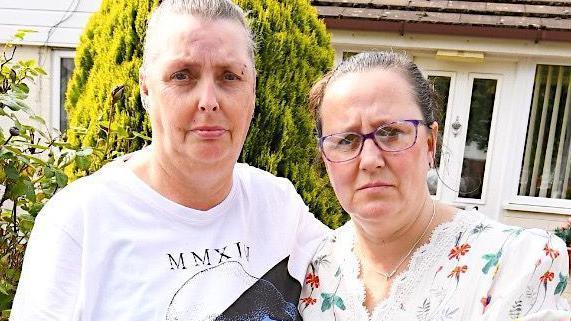Grieving woman faces eviction after tenancy succession shock

Anna Martin (above right, with sister Tracy) said she "knew nothing about succession rights until after Mum died"
- Published
A woman is facing eviction after a housing association refused to allow her to take up her late mother's tenancy due to it already having been passed to her dead brother.
Anna Martin wanted to succeed Veronica Martin, 79, as the tenant of their Kirkby home after Mrs Martin died in March.
However, she was told her brother was given sole "succession rights" in 2011, which could not be transferred, despite him dying in a decade before he could take over the tenancy.
Livv Housing (LH) said while it was "truly sympathetic to Ms Martin’s situation", legislation meant it was "only able to grant the right to succession for a secure tenancy once".
Ms Martin lived with her mother Veronica in the Tudor View home for six years and was her carer.
She said she believed that meant she and her son would be able to carry on living there, but a few days after her mother's death, she was told she would have to find somewhere else to live.
She said the "worry about losing our home" had meant the family "can’t begin to grieve".
“When you’ve had a family in a home for so many years, why would you want to re-let it when we need a home?” she said.
"Every family member we’ve lost has died in this house.
"There’s been birthdays, anniversaries, births and deaths – lots of happy memories and some not so happy."
She said she "knew nothing about succession rights until after Mum died".
"We never thought about her dying and were only focused on our life together."
'Discretionary succession'
Homeless charity Shelter said succession was the right to take over or inherit a tenancy when the tenant dies.
It said the tenancy must be the successor's main home when the relative dies, and they must have lived with the tenant for at least one year.
However, housing legislation states that succession rights can only be exercised once.
Those rights were given to Ms Martin's brother John in 2011, but he died in 2014, a decade before his mother.
As such, even though no succession was actually passed on, the property no longer has succession rights.
Ms Martin will be asked to leave the house on 20 May and will have to apply to go on the housing register for a social-rented tenancy, while her former home will be cleared and offered up to applicants on the same housing register.
Ms Martin said the LH housing officer had been kind and was working with the family to find a solution.
An LH representative said the organisation was "truly sympathetic to Ms Martin’s situation and sorry for the recent loss of her mother".
"Housing legislation outlines that we are only able to grant the right to succession for a secure tenancy once, and in this instance, the tenancy had already passed to Ms Martin’s brother," they said.
"We have a responsibility to address the significant demand for social housing throughout the borough, and ensure customers are supported with homes that are appropriate for their needs.
We’re continuing to liaise with the family to provide housing advice and assistance."
Some housing providers in England have adopted a discretionary succession rights policy which allows for changes on a case-by-case basis.
However, the LH representative said its policy stated that a "discretionary succession" applied when the person requesting to succeed to the tenancy was "left in the property on the death of the tenant but has no statutory or contractual right to succeed".
"They are asking us to exercise our discretion to let them stay as a tenant," they said.
"We are under no obligation to exercise that discretion."
Listen to the best of BBC Radio Merseyside on Sounds and follow BBC Merseyside on Facebook, external, X, external, and Instagram, external. You can also send story ideas to northwest.newsonline@bbc.co.uk, external